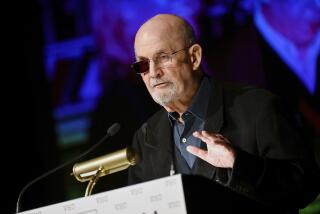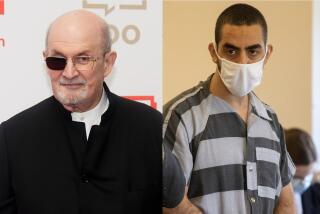Clinton Moves to Calm Furor Over Rushdie
- Share via
WASHINGTON — President Clinton, responding to outrage in the Muslim world over his meeting with British author Salman Rushdie, said Tuesday that he intended no disrespect toward followers of Islam.
Although aides insisted that Clinton was not apologizing for receiving the author of “The Satanic Verses,” a book deemed blasphemous by millions of Muslims, the President’s remarks appeared designed to soften the impact of last Wednesday’s brief meeting, which was controversial even within the Administration.
Clinton acknowledged that some of his advisers opposed his symbolic embrace of Rushdie, which resulted from a last-minute initiative by top White House political aides. They succeeded in overruling foreign policy experts, who wanted lower-level officials to meet with Rushdie.
As President, George Bush had refused to see the author, considering such a meeting too sensitive in the Islamic world. Rushdie’s agents had been pressing for a meeting with Clinton since shortly after the inauguration.
Rushdie, an Indian-born British citizen, is under a death decree issued nearly five years ago by Iran’s Ayatollah Ruhollah Khomeini, who condemned “The Satanic Verses” as heretical and an affront to all practicing Muslims. Although Khomeini has since died, Iranian President Hashemi Rafsanjani has not lifted the sentence and Islamic radicals in Iran have put a $3-million bounty on Rushdie’s head.
Clinton asserted Tuesday that by seeing Rushdie he hoped to make a statement about American devotion to free expression and opposition to state terrorism--not deliver a rebuke to the Muslim world.
“I respect the religion (Islam) and I respect the culture enormously, so I mean no disrespect to the people who have that religious faith,” Clinton said in response to a question at a news conference.
“But I do think it’s important that here in the United States we reaffirm our commitment to protecting the physical well-being and the right to speak of those with whom we may intensely disagree. . . . So I hope that I will not be misunderstood. I believe I made the right decision,” he said.
But Clinton sought to minimize the importance of the meeting, describing it almost as a chance encounter in the Old Executive Office Building, located next door to the White House.
Rushdie met last Wednesday, as previously arranged, with National Security Adviser Anthony Lake. Secretary of State Warren Christopher decided to join the meeting shortly before it took place. At the end of the session, Lake took Rushdie to see Clinton, a meeting that Clinton described this way:
“He met with Mr. Lake, and then I was over in the Old Executive Office Building and Mr. Lake brought him over there so I could see him and shake hands with him. We visited probably for a couple of minutes.”
The Clinton “drop-by” was arranged at the last minute by senior White House advisers George Stephanopoulos and David Gergen, who saw it as an opportunity for Clinton to make a point about free speech and the evils of intolerance.
While some White House officials portrayed the meeting as relatively insignificant, even an afterthought, it took on enormous symbolic importance in the Muslim world, where some clerics and political analysts denounced it as an insult to the Islamic faith and a blow to peace prospects in the Middle East.
The Ayatollah Mohammed Yazdi, head of Iran’s judiciary, said in a public address that Clinton had made himself “the most hated person before all Muslims of the world” by seeing Rushdie.
Other fundamentalist leaders elsewhere in the Muslim world have remained silent, however, and one White House official suggested that many Muslim leaders privately applauded the meeting in hopes it would deepen the isolation of Iranian extremists.
A senior Administration aide said the President’s remarks Tuesday were intended to ensure that there was no “misinterpretation” of the Rushdie meeting.
“There was a sense in some quarters that it was not what it was intended to be, a condemnation of acts of intolerance,” the official said. “It had nothing to do with disrespect for the religion of Islam.”
More to Read
Sign up for Essential California
The most important California stories and recommendations in your inbox every morning.
You may occasionally receive promotional content from the Los Angeles Times.













